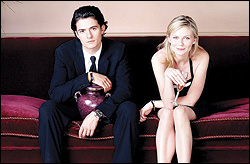Cameron Crowe’s family romance inspired by his father’s death is the biggest calamity in recent Hollywood history, but not because it’s anywhere near the worst movie. Much of Elizabethtown, which opens Friday, Oct. 14, at the Metro and other theaters, is not half bad. Some of its moments achieve the transcendence they ache to find. It contains pointed echoes of Crowe’s greatest hits and mini-homages to his finest cinematic mentors.
Like Jerry Maguire, Elizabethtown opens with a talented young man in a creative, cutthroat business who makes a visionary leap, flops, and gets the humiliating heave-ho from his ambitious girlfriend and his CEO. Drew (Orlando Bloom) is the designer of a too-innovative sports shoe that loses his Nike-like Portland company about three-quarters of a billion dollars. (As his boss, Alec Baldwin reprises his Glengarry Glen Ross bit in a gentler key.) Crowe’s protagonists are always doppelgängers of his self-image: the kindly kid in the pop-culture shark tank. In fact, he wouldn’t have survived this long if he hadn’t also learned to speak shark fluently, but it’s his radiant goodwill that distinguishes his auteurist persona.
Like the rock star in Almost Famous, Drew takes a plunge from the big-time, golden-god empyrean into the lowbrow world of dim, lovable every-folk—in this case, his own family back in Elizabethtown, Ky., which is to gather for his father’s funeral. Being the only passenger on his plane, Drew gets flirted with nonstop by flight attendant Claire (Kirsten Dunst), flexing her single dimple like a bodybuilder’s biceps. She’s a cross between Ione Skye’s brainy eccentric in Say Anything, Renée Zellweger’s underloved secretary in JM, Kate Hudson’s saintly groupie in AF (a part she stole from Dunst), and the screwball comediennes of Sturges, Hawks, Billy Wilder, et talkative al. They rapturously chat all night via cell phone and eventually rendezvous at Drew’s hotel. There, too, are Drew’s eccentric clan, gathered for the wake, and a drunken wedding party. The collisions contain a pleasant Local Hero–meets–Harold and Maude vibe, which Crowe has said he was after.
But Elizabethtown veers and lurches like a captainless ship overloaded with movie references. The central romance is like a firecracker that protractedly fizzles when it should sizzle. The repartee is odd and insufficiently witty. When the movie gets lost in its own aimlessness, Crowe horribly resorts to pop tunes and overwritten voice-overs.
By now you’ve heard the ugly rumors from the Toronto Film Festival—that Crowe’s “rough” long cut of the film prompted critical yawns and numerous walkouts. Elizabethtown is shorter now, but he didn’t cut enough. (Most painful is Susan Sarandon as Drew’s mother, performing a tap-dancing/stand-up comedy routine at her husband’s wake.)
Bloom is better and manlier than he was as the elf nerd made of Nerf in Kingdom of Heaven, but he still can’t carry a movie. Most of the time, he has to stare meaningfully, emoting feelings Crowe deeply feels but utterly fails to articulate. Dunst’s considerable charm is squandered. Her Claire compulsively talks to protect some secret self, but we never get any idea who she is—she’s a sphinx without a secret.
At the end, the movie becomes a whole different movie about a road trip. Claire makes Drew an annotated map of a cross-country drive, providing an excellent mixtape to highlight each stop, and commands him to follow her itinerary to the letter. It certainly makes her character weirder, but not more sympathetic.
Throughout his career, Crowe has preferred the beauty of innuendoes to the beauty of inflections, making it sweet when his innuendoes register and resonate, and puzzlingly pointless when they don’t. Elizabethtown is like a concept album with no concept, Singles with fewer hit singles. It’s a career disaster because Crowe hasn’t made enough hits to justify this many commercial failures in a row. (And let’s not even start with Vanilla Sky.) It’s no use to be a critics’ darling and audience favorite when the moguls are scared to risk their money on you. He is like nobody else in the movie universe, and it would be tragic to lose his voice. Unless his next film is a smash big enough to make up for this flop, we could lose him, the way we almost lost Scorsese forever after New York, New York. His movie in defense of the life force could actually snuff him.








